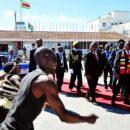We must continue to scale up malaria programmes, despite COVID-19

Malaria deaths could double if the fight against coronavirus detracts from anti-malaria efforts, warns Sierra Leone’s Health Minister Alpha T. Wurie.

Distributing malaria bed nets in Sierra Leone. Credit: Speak Up Africa.
In 2014, Sierra Leone – along with Liberia and Guinea – battled a devastating outbreak of Ebola. This deadly challenge taught us a lot, from the importance of tackling misinformation to ensuring rapid testing and treatment. In my country alone, we lost close to 4,000 lives to the virus.
This was a tragedy for our nation. People often forget, however, that during this difficult time, we lost even more lives to malaria. In Sierra Leone, this mosquito-borne disease has been a long-standing foe, with 1.78 million malaria cases confirmed in 2018.
Many African countries similarly struggle with malaria, which is why all 55 heads of state of the African Union launched the continent-wide Zero Malaria Starts with Me campaign in July 2018. Since then, the pan-African movement that calls for all citizens to take ownership of the fight end malaria has gone from strength to strength. 15 countries have now launched the campaign nationally, including Sierra Leone in 2019.
At the same time, however, our progress against malaria is under threat today. COVID-19 is taking hold of public health efforts to the extent that malaria deaths are set to double in 2020, according to recent World Health Organisation modelling.
We cannot let the fight against COVID-19 come at the detriment of our mission to end malaria. It is crucial that countries across Africa continue to scale up their malaria programmes and ensure the disease remains a priority. After all, malaria continues to claim the lives of over 400,000 people each year globally.
Since March 2020, Sierra Leone has been fighting to control the spread of COVID-19. However, we have continued to provide essential malaria services. We decided to push forward with our planned mass distribution of 4.6 million long-lasting insecticide-treated nets (LLINs), enough that every single Sierra Leonean can sleep under a bed net every night, all year round. We had to act quickly as the rainy season, the period of peak malaria transmission, was not going to wait for us.
LLINs are tried and tested interventions, proving to be the most cost-effective tools against malaria. The development and scaled up distribution of these nets over the last two decades are responsible for approximately 68% of the prevented malaria cases in Africa. They are just one element of a successful malaria control programme, but an important one that empowers communities to protect themselves against mosquitos.
Of course, the distribution of these nets did not come without challenges. Supply chains of key malaria commodities have been strained, and COVID-19 put our brave community health workers at heightened risk even with protective equipment and the government’s campaign encouraging “less touching”. To try to address these challenges, we set up even more distribution points, hired additional campaign staff, provided hand washing stations, and required recipients to wear facemasks and practice social distancing.
Everyone in Sierra Leone is affected by malaria, which is why we have engaged a wide range of stakeholders from all areas of society: members of parliament, mayors, religious leaders, paramount chiefs, the media, local councils, health and government officials, civil society organisations, traders, celebrities, footballers, models, actors, musicians and comedians. Using their voices and influence, these leaders are essential for ensuring people know how to stay safe and to seek diagnosis and treatment if experiencing a fever.
Our commitment to ending malaria is something we are proud of in Sierra Leone. However, malaria does not respect borders. Mosquitoes are not bound by country limits. That is why we call on neighbouring African countries to learn from our experience and continue to scale up malaria programmes despite the challenges of COVID-19. Naturally, we have had successes and failures; however, collaboration and knowledge sharing continue to be the best way of ensuring that only the successes are repeated.
2020 marks the beginning of a new decade, one in which we must strive to build stronger and more resilient health systems and to collectively mobilise to put an end to public health crises such as malaria.
As we say in Krio, Malaria e Don Wan Dae Na Mi Han.





